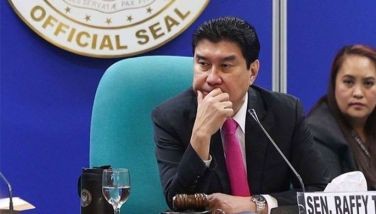Ilocos town sees boom in next decade
April 30, 2006 | 12:00am
CABUGAO, Ilocos Sur — This town is touted as the "Boracay of the North" for nothing. It teems with white sand beaches, forming part of its world-class tourism potential. Now, it proudly awaits the operation of a freeport zone.
With investments looming in the Salomague freeport zone, the local economy is seen to boom in the next decade.
Mayor Dioceasar Suero eagerly said that balikbayans all over the world who attended the 4th Global Reunion of Cabugenians at the Cabugao Beach Resort last April 23 were keen on various investment opportunities which the municipality offers.
The investment forum, perhaps a first in Ilocos Sur, was one of the highlights of the 5th Intayon Cabugao Festival featuring the Sakada Centennial Celebration and the 4th Global Reunion of Cabugenians.
Present during the forum were heads of line agencies of the national government, representatives of the private sector and local officials, all banding together to chart the agricultural town’s progress in the next decade.
"The forum gained headway for our economic development because our townmates from abroad signified their willingness to invest some of their earnings in our town," Suero said.
Ilocos Sur Vice Gov. Deogracias Victor Savellano said the local government identified business opportunities wherein Cabugenians could venture.
The historic Salomague freeport zone is where more than a thousand Ilocanos boarded a Hawaii-bound ship in 1946 to work as sakadas in vast sugarcane plantations on the Pacific island.
Among the possible ventures identified during the investment forum were commercial banks, appliance and motor centers, ice plant, greenhouse, seaweed and organic farming, a Montessori—inspired school, and tourism villages.
Some of these business prospects are being eyed at the town center, particularly near the Northern Ilocos Sur Trade Center.
"Because of the high cost of education, our balikbayans want to have a Montessori school in our town," Suero said.
Last April 23, Mayor Alan Arakawa of Maui County, Hawaii, together with Suero and Savellano, led the wreath-laying at the foot of the Sakada Monument to honor once again the Ilocano sugarcane plantation workers who left their families and their hometown 100 years ago.
In tearful rites, Suero spoke about the townfolk’s patience, thriftiness, loyalty and discipline, the same virtues which, he said, are embodied in his administration’s "DIO-C" program of discipline, orderliness and cleanliness.
Arakawa, for his part, vowed that his visit would strengthen bilateral trade and cooperation in different programs that would uplift the socio-economic conditions of Ilocanos.
In 1946, the last batch of 6,000 Ilocano migrants left the Cabugao port on board SS Maunawili.
That same year, SS Marine Falcon docked here to ferry some 710 women and 1,425 children of the sakadas to Hawaii.
With investments looming in the Salomague freeport zone, the local economy is seen to boom in the next decade.
Mayor Dioceasar Suero eagerly said that balikbayans all over the world who attended the 4th Global Reunion of Cabugenians at the Cabugao Beach Resort last April 23 were keen on various investment opportunities which the municipality offers.
The investment forum, perhaps a first in Ilocos Sur, was one of the highlights of the 5th Intayon Cabugao Festival featuring the Sakada Centennial Celebration and the 4th Global Reunion of Cabugenians.
Present during the forum were heads of line agencies of the national government, representatives of the private sector and local officials, all banding together to chart the agricultural town’s progress in the next decade.
"The forum gained headway for our economic development because our townmates from abroad signified their willingness to invest some of their earnings in our town," Suero said.
Ilocos Sur Vice Gov. Deogracias Victor Savellano said the local government identified business opportunities wherein Cabugenians could venture.
The historic Salomague freeport zone is where more than a thousand Ilocanos boarded a Hawaii-bound ship in 1946 to work as sakadas in vast sugarcane plantations on the Pacific island.
Among the possible ventures identified during the investment forum were commercial banks, appliance and motor centers, ice plant, greenhouse, seaweed and organic farming, a Montessori—inspired school, and tourism villages.
Some of these business prospects are being eyed at the town center, particularly near the Northern Ilocos Sur Trade Center.
"Because of the high cost of education, our balikbayans want to have a Montessori school in our town," Suero said.
Last April 23, Mayor Alan Arakawa of Maui County, Hawaii, together with Suero and Savellano, led the wreath-laying at the foot of the Sakada Monument to honor once again the Ilocano sugarcane plantation workers who left their families and their hometown 100 years ago.
In tearful rites, Suero spoke about the townfolk’s patience, thriftiness, loyalty and discipline, the same virtues which, he said, are embodied in his administration’s "DIO-C" program of discipline, orderliness and cleanliness.
Arakawa, for his part, vowed that his visit would strengthen bilateral trade and cooperation in different programs that would uplift the socio-economic conditions of Ilocanos.
In 1946, the last batch of 6,000 Ilocano migrants left the Cabugao port on board SS Maunawili.
That same year, SS Marine Falcon docked here to ferry some 710 women and 1,425 children of the sakadas to Hawaii.
BrandSpace Articles
<
>
- Latest
- Trending
Trending
Latest
Trending
Latest
Recommended






























